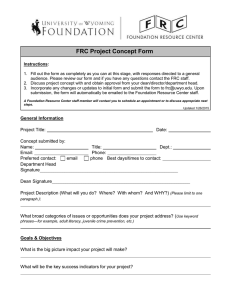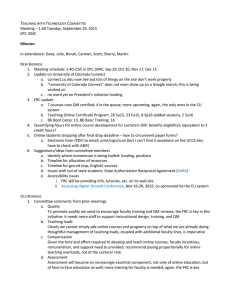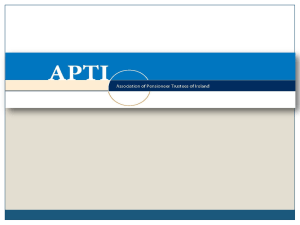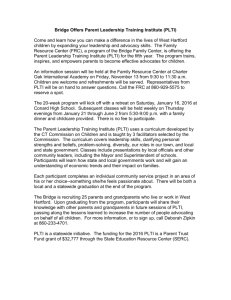Policy on Developing Statements of Recommended Practice (SORPs)
advertisement
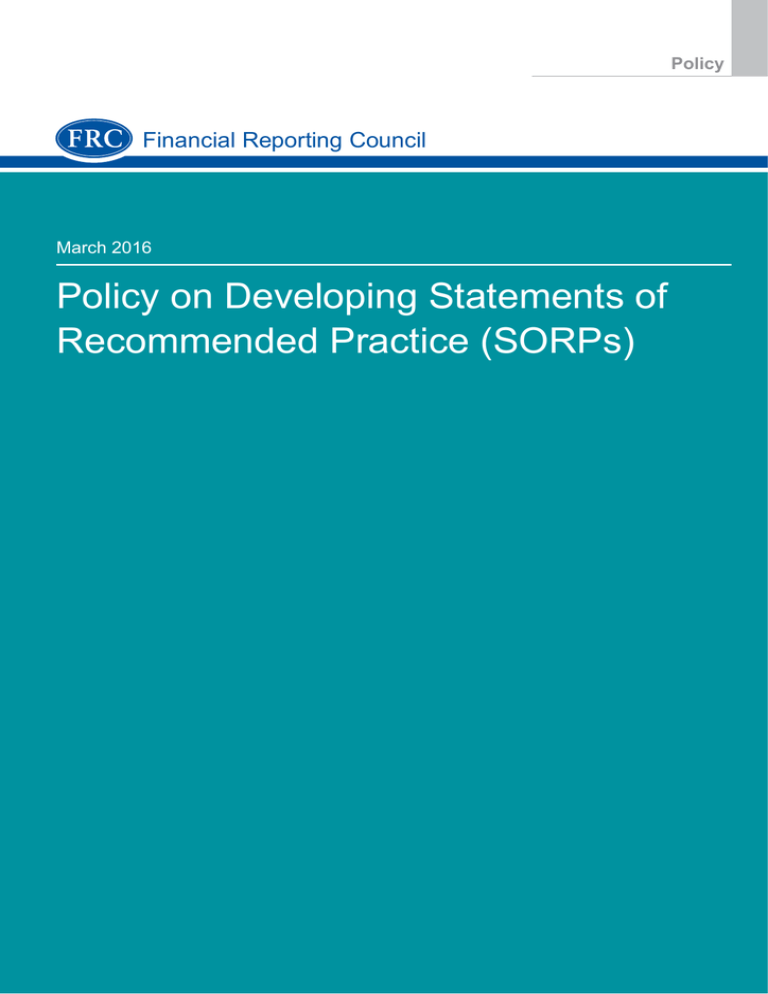
Policy Professional discipline Financial Reporting Council March 2016 Policy on Developing Statements of Recommended Practice (SORPs) The FRC is responsible for promoting high quality corporate governance and reporting to foster investment. We set the UK Corporate Governance and Stewardship Codes as well as UK standards for accounting, auditing and actuarial work. We represent UK interests in international standard-setting. We also monitor and take action to promote the quality of corporate reporting and auditing. We operate independent disciplinary arrangements for accountants and actuaries, and oversee the regulatory activities of the accountancy and actuarial professional bodies. The FRC does not accept any liability to any party for any loss, damage or costs howsoever arising, whether directly or indirectly, whether in contract, tort or otherwise from any action or decision taken (or not taken) as a result of any person relying on or otherwise using this document or arising from any omission from it. © The Financial Reporting Council Limited 2016 The Financial Reporting Council Limited is a company limited by guarantee. Registered in England number 2486368. Registered Office: 8th Floor, 125 London Wall, London EC2Y 5AS Contents Page Introduction 3 Overarching Criteria for Developing a SORP 4 Becoming a SORP making body 5 Development of SORPs 6 Developing or Revising a SORP 6 Maintenance of SORPs 9 Recognition of SORPs by the FRC 12 Financial Reporting Council 1 2 Policy on Developing Statements of Recommended Practice (March 2016) FRC Policy on Developing Statements of Recommended Practice (SORPs) Introduction This document sets out the Financial Reporting Council’s (FRC) policy on developing Statements of Recommended Practice (SORPs), with effect from 3 March 2016. This Policy replaces the FRC’s Policy and Code of Practice on SORPs dated April 2014. The FRC is a prescribed body for issuing accounting standards in the UK and its accounting standards are also applied in the Republic of Ireland. The FRC issues technical auditing standards and ethical standards for auditors for use in the UK and Ireland1. The FRC also issues technical actuarial standards in the UK. SORPs are sector-driven recommendations on financial reporting, auditing practices and actuarial practices for specialised industries, sectors or areas of work, or which supplement FRC standards and other legal and regulatory requirements in the light of special factors prevailing or transactions undertaken in that particular industry, sector or area of work that are not addressed in FRC standards. SORPs also address matters that are addressed in FRC standards, but about which additional guidance is considered necessary. Where there are policy options in FRC standards, a SORP may recommend the most appropriate option to the particular industry or sector. SORPs may only be issued by ‘SORP-making bodies’. A SORP-making body is a body that has been recognised by the FRC for the purpose of producing the SORP for a particular industry or sector. SORP-making bodies have a responsibility to act in the public interest when developing and issuing a SORP. To be recognised as a SORP-making body, a particular industry or sectoral body must meet criteria set by the FRC and must agree to develop SORPs in accordance with this Policy. A SORP must carry a Statement by the FRC confirming, as appropriate, that the SORP does not appear to contain any fundamental points of principle that are unacceptable in the context of current financial reporting practice, auditing practice or actuarial practice, nor does it conflict with an FRC standard or undermine the FRC’s broader objectives. 1 The professional bodies require their members to use FRC issued auditing and ethical standards. BIS is currently considering legislative changes to provide a legal basis to underpin the use of standards. Financial Reporting Council 3 Overarching Criteria for Developing a SORP The FRC will consider authorising the development of a SORP in support of FRC standards if the circumstances warrant it, for example if one or more of the following factors are present: i. there are indications that issuing a SORP will lead to higher quality financial reporting, auditing or actuarial work or conversely a risk of unacceptable quality if a SORP is not issued; there is evidence or a risk of inconsistent practice across different entities overall or within a particular industry leading to an unacceptable lack of comparability; there is an industry or sector specific need; changes within a particular industry or sectors means mean an FRC standard requires additional application guidance; or there is a recognised need in the public interest to establish a benchmark for accountability of professionals. ii. iii. iv. v. In certain circumstances, the FRC may, at its sole discretion, decide that it would be most appropriate if the additional guidance is issued by the FRC. The sorts of circumstances envisaged include: the additional guidance is necessary to secure compliance with international obligations; the intention is to supplement standards through additional guidance; allowing the additional guidance to be issued by a trade representative or professional body could create a real or perceived conflict of interest; the public interest lies in maintaining independence from the profession; or a speedy response from the FRC is needed, at least in the first instance. 4 Policy on Developing Statements of Recommended Practice (March 2016) Becoming a SORP-making Body The FRC may recognise bodies for the purpose of developing and issuing SORPs. Bodies will only be recognised where the following criteria are met: (i) the industry or sector represented by the body in question has special financial reporting, auditing or actuarial issues and the application or interpretation of FRC standards requires clarification in order to deal with those issues; (ii) the body in question represents the whole or a major part of the industry or sector; (iii) the body shares the FRC’s aim of: (a) high-quality financial reporting proportionate to the size and complexity of the entity and users’ information needs; or (b) high-quality auditing work proportionate to the needs, size and complexity of the entity; or (c) high-quality actuarial work. (iv) the body agrees to abide by this Policy in developing its SORP; (v) the body commits to reviewing its SORP in line with this Policy; (vi) where an industry or sector is regulated or financed by another body, the regulator or financing body has confirmed in writing that it is content for the body seeking recognition by the FRC as a SORP-making body to promulgate SORPs for that industry or sector. The FRC may, at its sole discretion, withdraw recognition of a SORP-making body if it considers that the above criteria are no longer met, or if the SORP-making body fails to act in accordance with this Policy. In the event that the FRC withdraws recognition of a SORP-making body, it may publish that fact if it considers that publicity is necessary or desirable in the public interest. Financial Reporting Council 5 Development of SORPs 1. Industry and sector bodies that wish to develop SORPs must first secure recognition by the FRC as a SORP-making body. Once recognition as a SORP-making body has been granted, a body may proceed to develop a new SORP. Developing or revising a SORP 2. Before starting work on the development of a SORP, a SORP-making body should seek approval from the FRC, by contacting the relevant FRC Executive Director. This will ensure that the proposed SORP does not overlap with an FRC project or address a matter that the FRC would prefer to deal with itself. It should also agree with the FRC the nature and scope of the SORP. 3. A SORP should specify the types of entity or work to which the SORP is intended to apply. Where entities or work may fall within the scope of more than one SORP, the SORP to be applied will usually be the SORP with the more specific application. In such circumstances, the SORP-making body should agree with the FRC and the other relevant SORP-making bodies which SORP should apply and identify this clearly within the relevant SORPs. 4. A SORP should aim to promote consistency across the industry, sector or type of work by recommending a preferred treatment, approach or methodology. It should also seek, where practicable and appropriate, to adopt an approach or methodology that is consistent with the approach taken in similar industries, sectors or areas of work. 5. A SORP should clearly indicate those areas that relate to the subject matter of FRC standards and those that relate to other information to be provided in a document containing that subject matter. A SORP should clearly indicate which recommendations provide guidance on applying FRC standards and which go beyond the application of FRC standards (for example by recommending additional disclosure). 6. SORPs should be developed in line with current FRC standards and best practice. The provisions of a SORP cannot override the provisions of the law, regulatory requirements or FRC standards. 7. Where a more recently issued FRC standard or a change in legislation creates a conflict with the provisions of an existing SORP, the relevant provisions of the SORP will cease to have effect. The SORP-making body is responsible for updating the relevant provisions within the SORP on a timely basis to bring them into line with new legislation or FRC standards or to withdraw them as appropriate. 8. A SORP should include a clear and prominent statement along the following lines: “In developing this SORP, all [accounting / auditing / actuarial] standards [and other FRC pronouncements] issued by [insert date] were considered in the development of the SORP.” 6 Policy on Developing Statements of Recommended Practice (March 2016) 9. After considering FRC standards in their entirety, SORP-making bodies should ensure that a SORP makes clear which sections of the relevant FRC standard(s) and other pronouncements in effect at the date of publication of the SORP have been addressed in the development of the SORP, including an indication as to their relevance to the industry, sector or work in question and an explanation of how each has been dealt with in the SORP. 10. Failure to update a SORP does not exempt reporting entities or practitioners from applying the FRC standards effective at the relevant date. Entities that operate in the public sector or under specific legislative regimes should be guided by those regimes in assessing whether they are prevented or exempt from complying with this requirement. 11. SORP-making bodies should include in their SORP a statement setting out the status of the SORP with reference to FRC standards, along the following lines: “Entities or work complying with this SORP shall apply the [accounting / auditing / actuarial] standards applicable at the relevant reporting date (which does not preclude early application where permitted). Where the current edition of this SORP predates a change in legislation or [accounting / auditing / actuarial] standards and a conflict is thereby created, the affected provisions of this SORP cease to have effect.” Accountability 12. SORPs must be drafted by the SORP-making body itself or by a properly constituted working party of the SORP-making body. The SORP-making body should inform the FRC of the arrangements it is putting in place to develop the SORP, including the membership of its working party, and provide an appropriate point of contact to the FRC. FRC staff must be accorded observer status at meetings of the SORP-making body or SORP working party, whichever is appropriate. 13. The SORP development process must ensure: 14. (a) the participation of a sufficiently broad range of representatives of the industry or sector concerned (including where appropriate practitioners and other regulators); (b) independent members who represent the wider public interest, who should be in the majority where audit SORPs are concerned; (c) where possible, users of financial statements, audit reports or actuarial information; and (d) sufficient technical support. The SORP-making body must provide evidence of the process followed and effective participation by stakeholders. The FRC will not normally agree to make a Statement on the SORP unless it is satisfied that: Financial Reporting Council 7 (a) in developing the SORP: (i) due process was followed; (ii) an appropriate cross-section of stakeholders was involved; and (b) the SORP does not contain any fundamental points of principle that are unacceptable in the context of current financial reporting practice, auditing practice or actuarial practice, nor does it conflict with an FRC standard(s) or undermine the FRC’s broader objectives. Due process 15. Proceedings of the SORP-making body or its working party should be conducted in a spirit of openness and follow due process including open consultation. 16. During the development or revision of a SORP, the SORP-making body is responsible for identifying potential divergence from FRC standards and must inform the FRC of any such potential divergence as soon as possible. 17. Where a proposed SORP includes recommendations that go beyond the application of FRC standards (for example by recommending additional disclosure) the FRC will need to be satisfied that the SORP-making body has given appropriate consideration to the expected impact in terms of costs and benefits. 18. Before finalising and publishing the SORP, the SORP-making body should proactively seek the views of stakeholders and should consult publicly. The preferred mechanism for public consultation is a published draft, with a minimum three month comment period. In certain circumstances a shorter period of consultation may be acceptable. The FRC will, however, need to be satisfied that the nature of the consultation and length of the comment period was appropriate. 19. In some cases, a SORP-making body may wish to seek input via a published statement of intent in advance of publishing a consultation draft. However, a published statement of intent is not an acceptable substitute for a published consultation draft and will consequently delay development of the SORP. 20. All statements of intent, consultation drafts and final SORPs should be presented to the FRC for comment before publication. The SORP-making body must allow sufficient time for any changes sought by the FRC to be incorporated prior to publication. 21. A statement should be included in a SORP consultation draft or statement of intent setting out the scope of the FRC’s review, along the following lines: “In accordance with the FRC’s Policy on Developing Statements of Recommended Practice the FRC carried out a review of the proposed SORP focusing on those aspects 8 Policy on Developing Statements of Recommended Practice (March 2016) relevant to the [financial statements / audit report / actuarial information] but also including aspects relevant to the FRC’s broader responsibilities where appropriate.” 22. In addition, the FRC reserves the right to require a statement to be included within a statement of intent or consultation draft indicating areas of overlap with its own work and any reservations it has regarding the content of the statement of intent or consultation draft. 23. Before publishing a final SORP, the SORP-making body must provide the FRC with copies of consultation responses and comment letters, an analysis or summary of the main comments and an indication of how the comments have been dealt with. In this way the FRC can satisfy itself that stakeholder comments have been appropriately considered. 24. SORP-making bodies are expected to adopt a transparent process and accordingly, comment letters should be made publicly available unless confidentiality is requested by the respondent. SORP-making bodies should publish on their websites all responses to formal consultations. SORP-making bodies should aim to publish responses as soon as possible and within 10 days of receipt. Consistency between SORPs 25. As SORPs should be developed in the context of current FRC standards and best practice the FRC will expect a degree of consistency between SORPs if they are addressing similar matters for different industries, sectors or work, unless there are good reasons for different approaches (for example different user needs and different legal or regulatory environments). 26. The FRC will consider consistency between SORPs as part of its review. The FRC’s ‘Statement on the SORP’ 27. The SORP-making body must obtain the written consent of the FRC to include a Statement on the SORP. The FRC’s Statement on the SORP should be included in a prominent place in each SORP. No other reference to the FRC should be made without prior written approval of the FRC. Maintenance of SORPs 28. The SORP-making body should provide the FRC with an appropriate point of contact for the purposes of reviewing and maintaining the SORP. 29. Responsibility for maintaining a SORP falls to the body which promulgated that SORP. In promulgating a SORP, the SORP-making body undertakes to review on an annual basis each SORP for which it is responsible. In particular the body should consider: (a) any implications for the SORP of new and proposed accounting, auditing or actuarial standards – any divergence should be notified to the FRC as soon as possible; Financial Reporting Council 9 30. (b) any evidence of widespread or significant failure in the relevant industry or sector to follow any part of the guidance contained in the SORP, of which the SORPmaking body is aware; (c) developments in the industry or sector which suggest that further guidance in respect of their accounting, auditing or actuarial treatment is desirable; and (d) the continued need for the SORP. The SORP-making body should provide the FRC with an account, in writing, of the findings of its annual review, and include the current membership of the SORP-making body and any working parties. The account should also reaffirm the SORP-making body’s commitment to complying with this Policy, and state whether it proposes to revise any of the SORPs for which it is responsible in the light of the findings of its annual review. Consequential amendments to SORPs 31. 32. Where it is necessary to amend a SORP in order to reflect changes in FRC standards or in legislative or regulatory requirements, and the amendments will not involve new interpretation of those requirements or introduce other changes, the SORP-making body may agree with the FRC that: (a) the requirement to publish a consultation draft would be disproportionate in the circumstances; and (b) these changes can therefore be made by way of a shortened administrative procedure, after which the FRC will issue its Statement on the SORP. In the event amendments are to be made via this shortened administrative procedure, the SORP-making body agrees to give notice of its intention to amend the SORP on its website. Withdrawal of the FRC’s ‘Statement on the SORP’ 33. The FRC reserves the right to withdraw its Statement at any time if it considers that it is no longer appropriate to maintain its Statement, for example because: (a) the SORP is out of date; (b) the SORP has been superseded by developments in FRC standards or by legislative or regulatory requirements; (c) the SORP-making body does not review and/or maintain the SORP in line with this Policy; or (d) the SORP-making body refuses to implement changes to the SORP that are requested by the FRC. 10 Policy on Developing Statements of Recommended Practice (March 2016) Additional Guidance 34. It will not normally be necessary for a SORP-making body to supplement a SORP with further guidance. Material that a SORP-making body proposes to issue which offers an interpretation of FRC standards should normally be included in the SORP itself. In the event that a SORP-making body intends to issue supplementary material, the development of that material should be submitted to the same due process and scrutiny as a SORP, including review by the FRC. 35. There are, nevertheless, three sets of circumstances in which it may be desirable to publish further guidance outside the SORP itself, as follows: (a) an urgent need for guidance on a new accounting standard or other relevant publication issued after publication of the SORP – any such guidance should normally be incorporated into the SORP at the earliest subsequent opportunity; (b) further guidance is necessary in order to interpret the requirements of the SORP for a particular sub-sector; or (c) further guidance on the application of the SORP is necessary in order to aid practitioners. 36. In the situations cited in paragraph 35, the SORP-making body should notify the FRC and explain what guidance is proposed. The FRC may require that a reference to the FRC is included in the guidance. The guidance should not be published without the agreement of the FRC. 37. The FRC does not usually endorse guidance issued outside the SORP. However, where it is clear in relation to matters that fall within paragraph 35 (a), that: (a) guidance is urgently needed on a significant issue and cannot be delayed until revision of the SORP; and (b) the SORP-making body follows the same due process that it would normally follow when revising a SORP, including review by the FRC, then the FRC’s Statement on the SORP may be attached to the guidance, thereby according it the same authority as the SORP. 38. For situations that fall within paragraphs 35(b) and (c), the SORP-making body should include in any published guidance a statement that clearly indicates the authority of that material and states that it is not part of the SORP and has not been reviewed by the FRC. An example of such a statement is set out below: “the overall aim of the guidance is to assist practitioners in the preparation of [financial statements / audit reports / carrying out actuarial work]. It does not form part of the [date and name of SORP], nor has it been reviewed by the FRC. It attempts to explain and illustrate what is required under [date and name of SORP] but does not carry the authority of the SORP.” Financial Reporting Council 11 Recognition of SORPs by the FRC SORPs issued by SORP-making bodies must include the FRC’s ‘Statement on the SORP’. The FRC will only issue a Statement on the SORP if it has been developed in accordance with this Policy. FRC review of SORPs Before issuing a Statement on the SORP, the FRC will conduct a review of the proposed SORP to determine whether the SORP: (a) has been developed in accordance with this Policy; and (b) contains fundamental points of principle that are unacceptable in the context of current practice; and (c) contains requirements that conflict with the requirements or principles of an FRC standard; and (d) supports matters that fall within the FRC’s broader responsibilities, to the extent this is relevant to the industry, sector or area of work in question. Where a SORP provides recommendations relating to other information to be provided in a document containing the financial statements / audit report / actuarial information, and the FRC believes the SORP’s requirements or recommendations in relation to those areas could undermine the credibility of the document containing the financial statements / audit report / actuarial information, it will discuss the issue with the SORP-making body. If this does not resolve the issue, the FRC will consider the implications for its Statement on the SORP, and may vary its Statement to fit the circumstances. FRC Statement on the SORP The Statement on the SORP will: outline the nature of the review the FRC has undertaken; confirm that the SORP does not appear to contain any fundamental points of principle that are unacceptable in the context of current financial reporting practice, auditing practice or actuarial practice or to conflict with an FRC standard; and where relevant, confirm that the SORP does not appear to undermine the FRC’s broader objectives. The FRC will vary its Statement on the SORP to fit the circumstances of an individual SORP. An example of the kind of Statement that will be issued is set out below: “The aim of the Financial Reporting Council (FRC) is to promote high-quality corporate governance and reporting to foster investment. In relation to [choose one] accounting standards applicable in the UK and Republic of Ireland, the FRC’s overriding objective is to enable users of accounts to receive high-quality understandable financial 12 Policy on Developing Statements of Recommended Practice (March 2016) reporting proportionate to the size and complexity of the entity and users’ information needs. In particular industries or sectors, clarification of aspects of those standards may be needed in order for the standards to be applied in a manner that is relevant and provides useful information to users of financial statements in that industry or sector. or auditing standards applicable in the UK and Republic of Ireland, the FRC’s overriding objective is to enable users of audit reports or other information issued by the auditor to receive highquality understandable information and audit reports proportionate to the size and complexity of the entity and users’ information needs. In particular industries or sectors, clarification of aspects of those standards may be needed in order for the standards to be applied in a manner that is relevant and provides useful information to users of audit reports or other information issued by the auditor in that industry or sector. or actuarial standards applicable in the UK the FRC’s overriding objective is that the users for whom a piece of actuarial information was created should be able to place a high degree of reliance on the information’s relevance, transparency of assumptions, completeness and comprehensibility, including the communication of any uncertainty inherent in the information. For particular actuarial work, clarification may be needed in order for the standards to be applied in a manner that is relevant and provides reliable information to the user Such clarification in connection with accounting / auditing / actuarial standards is issued in the form of Statements of Recommended Practice (SORPs) by bodies recognised for this purpose by the FRC. The [insert name of body] has confirmed that it shares the FRC’s aim of highquality financial reporting / audit practice / actuarial work and has been recognised by the FRC for the purpose of issuing SORPs for the [industry, sector or area of work]. In accordance with the FRC’s Policy on Developing Statements of Recommended Practices the FRC carried out a review of the SORP focusing on those aspects relevant to the financial statements / audit work / actuarial work but also including aspects relevant to the FRC’s broader responsibilities where appropriate. On the basis of its review, the FRC has concluded that the SORP has been developed in accordance with the FRC’s Policy on SORPs and does not appear to contain any fundamental points of principle that are unacceptable in the context of present [financial reporting practices / auditing practices / actuarial practices] or to conflict with an [accounting / auditing / actuarial] standard [ or to undermine the FRC’s broader objectives].” [date] When issuing a Statement on the SORP, the FRC is making an assessment of that SORP at a particular moment. The FRC gives no guarantee that it will not, at some point in the future, issue a pronouncement that supersedes that SORP. Financial Reporting Council 13 FRC Governance Responsibility for discharging the functions set out in this Policy will fall to: A Committee of the FRC Board, advised by the relevant Council(s), when deciding whether or not the FRC should recognise individual bodies as SORP-making bodies. A Committee of the FRC Board, advised by the relevant Council(s) (and its advisory groups), when deciding whether or not to issue a Statement on the SORP unless the FRC Board has specific responsibility in legislation for issuing a Statement on the SORP (where it will be advised by a Committee of the FRC Board and the relevant Council (and its advisory groups)). The table below sets out how this will operate within the current FRC structure: Action Carried out by Recognition as SORP-making body FRC Board Committee on advice of relevant Council Statement on a SORP FRC Board or Board Committee on advice of relevant Council Approval to publish draft of a SORP Council (on advice of Council advisory groups, as appropriate) Review of a SORP Council advisory groups, as appropriate 14 Policy on Developing Statements of Recommended Practice (March 2016) Financial Reporting Council 8th Floor 125 London Wall London EC2Y 5AS +44 (0)20 7492 2300 www.frc.org.uk
